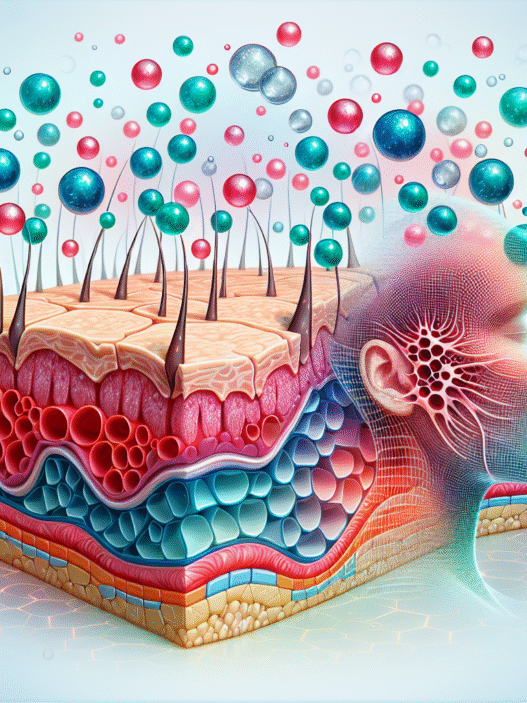Understanding Hyaluronic Acid
Hyaluronic acid (HA) is a vital component in skin health, cherished for its ability to retain moisture and promote youthful, vibrant skin.
Role in Skin Health
Hyaluronic acid is the primary molecule involved in skin moisture. It plays an essential role in maintaining hydration and skin elasticity. The loss of moisture in the skin is linked to HA migrating to deeper layers, causing visible signs of aging. This depletion can result in dryness and reduced elasticity, leading to the formation of fine lines and wrinkles. To maintain skin health, regular intake of hyaluronic acid through topical products or supplements is crucial. For more information on its effects, explore our article on hyaluronic acid benefits.
| Function | Description |
|---|---|
| Moisture Retention | Retains water to keep skin hydrated. |
| Elasticity | Helps maintain skin’s firmness and suppleness. |
| Wound Healing | Aids in skin recovery post-injury. |
Importance of Hydration
Hydration is fundamental to skin vitality, and hyaluronic acid’s ability to hold water is unparalleled. It can retain up to 1,000 times its weight in water, making it a powerhouse for maintaining skin hydration. Proper hydration supports skin barrier function and protects against external stressors such as UV exposure and pollution, which can cause degradation of HA and further skin damage.
Ensuring adequate skin hydration contributes not just to appearance; it enhances the skin’s overall health and resilience to environmental factors. Those interested in palliative care for their skin can benefit from using hyaluronic acid in products like serums, moisturizers, and creams. Check our guide on hyaluronic acid moisturizer for more insights.
For optimal results, understanding the relationship between hyaluronic acid and skin hydration is paramount. This insight can lead to effective strategies in achieving a youthful glow and reducing signs of aging. For further exploration, consider looking into the connection between hyaluronic acid and collagen and its joint benefits to skin health.
Benefits of Hyaluronic Acid
Hyaluronic acid is known for its significant advantages in maintaining youthful skin. The key areas where it excels include skin rejuvenation and enhancing skin elasticity.
Skin Rejuvenation
Hyaluronic acid plays a critical role in skin rejuvenation. It is the primary molecule involved in skin moisture, helping to maintain hydration and promote a youthful appearance. A 2022 review highlighted that topical hyaluronic acid is an effective treatment, especially after facial or postsurgical rejuvenation procedures, combating signs of aging and improving overall skin quality (Medical News Today).
The ability of hyaluronic acid to retain moisture—up to 1,000 times its weight—ensures that the skin remains plump and hydrated. Clinical studies have shown that various molecular weights of hyaluronic acid can yield improvements in skin hydration, elasticity, and even reduction in wrinkle depth. These benefits reaffirm its efficacy as a crucial ingredient in skin rejuvenation treatments (PubMed Central).
| Benefit | Description |
|---|---|
| Moisture Retention | Holds up to 1,000 times its weight in water, keeping skin hydrated. |
| Post-Procedure Recovery | Effective after facial or surgical treatments to enhance skin recovery. |
| Wrinkle Reduction | Improves depth of wrinkles with consistent use. |
Enhanced Skin Elasticity
Another significant benefit of hyaluronic acid is its ability to enhance skin elasticity. As the skin ages, its natural levels of hyaluronic acid decrease, resulting in reduced elasticity and firmness. A 2023 study involving 123 females found that oral administration of hyaluronic acid improved not only skin hydration but also skin tone and epidermal thickness, indicating its pivotal role in maintaining skin elasticity (Medical News Today).
The application of topical formulations, especially those containing lower molecular weight hyaluronic acid, allows for deeper penetration into the skin. This results in improved elasticity, skin firmness, and a more youthful appearance. The scientific understanding behind the interplay of hyaluronic acid, skin hydration, and elasticity reinforces its place in anti-aging skincare routines. For details on effective applications, check our article on hyaluronic acid for skin.
| Aspect | Impact |
|---|---|
| Skin Elasticity | Enhances the skin’s ability to stretch and return to its original shape. |
| Firmness | Contributes to a tighter, more resilient skin structure. |
| Age-Related Changes | Counteracts the natural decline in elasticity associated with aging. |
For beauty and skincare enthusiasts, incorporating hyaluronic acid into their regimen through serums, moisturizers, or even hyaluronic acid injections can lead to significant improvements in skin rejuvenation and elasticity.
Application of Hyaluronic Acid
Hyaluronic acid (HA) is increasingly prominent in the beauty industry for its remarkable contributions to skin rejuvenation. The application of hyaluronic acid can be categorized into two main forms: topical treatments and oral supplements.
Topical Treatments
Topical applications of hyaluronic acid are popular among skincare enthusiasts. The most common form is hydrating serums, which are designed to infuse moisture into the skin. These serums can enhance skin hydration, elasticity, and overall texture. Studies have shown that long-term use of HA serums helps improve skin flexibility and increases skin elasticity (Cleveland Clinic).
The effectiveness of these products largely depends on their concentration and the formulation used. Many consumers opt for the following types of topical applications:
| Product Type | Key Features |
|---|---|
| Hyaluronic Acid Serum | Provides deep hydration, enhances skin plumpness. Available in various concentrations. |
| Hyaluronic Acid Cream | Often more moisturizing than serums, suitable for dry skin types. |
| Hyaluronic Acid Moisturizer | Combines HA with other ingredients to lock in hydration effectively. |
For those interested in incorporating these treatments into their routine, there are numerous hyaluronic acid serum options available that can cater to different skin types and conditions.
Oral Supplements
Oral supplements containing hyaluronic acid have gained attention for their potential systemic benefits. A study with 123 females demonstrated that oral hyaluronic acid improved skin hydration, skin tone, and epidermal thickness, highlighting its efficacy in skin rejuvenation.
The table below outlines some potential benefits of oral hyaluronic acid supplements:
| Benefit | Description |
|---|---|
| Improved Skin Hydration | Increases moisture retention within skin. |
| Enhanced Skin Tone | Contributes to a more even skin complexion. |
| Increased Epidermal Thickness | Supports skin structure and resilience. |
Oral HA supplements are generally considered safe, with long-term use showing positive results for overall skin health. Consumers seeking to include HA in their routine can explore various formulations of hyaluronic acid supplements to find one that suits their needs.
Both topical treatments and oral supplements underscore the versatility of hyaluronic acid in fostering skin rejuvenation. For enhanced results, it is often recommended to use a combination of both methods, making the most of the benefits offered by this potent ingredient.
Safety and Effectiveness
FDA Approval
Hyaluronic acid has garnered attention not only for its benefits in hyaluronic acid and skin rejuvenation, but also for its safety profile. The FDA has approved hyaluronic acid injections for specific medical conditions, particularly for alleviating knee pain in individuals with mild to moderate osteoarthritis. A 2022 review of 38 studies supports the safety and effectiveness of these injections in treating joint pain (Medical News Today). In addition, over-the-counter products containing hyaluronic acid, such as serums and creams, are generally deemed safe for use in skincare.
Proper Administration
Proper administration of hyaluronic acid treatments is crucial for achieving desired outcomes while minimizing risks. When it comes to injections, these should only be performed by licensed and qualified medical professionals to ensure safety and efficacy. The Cleveland Clinic emphasizes the importance of professional administration for injectable products (Cleveland Clinic).
For topical applications, hyaluronic acid is available in various forms such as serums, moisturizers, and eye care products. Over-the-counter options are generally safe for most users, but users should monitor their skin’s response to these products. Oral supplements containing hyaluronic acid are also considered safe but should be taken following the dosage instructions provided on the packaging.
| Form of Hyaluronic Acid | Administration Method | Safety Status |
|---|---|---|
| Topical (serums, creams) | Over-the-counter | Generally Safe |
| Injectable (for joints) | Administered by professionals | FDA Approved |
| Oral Supplements | Taken as directed | Generally Safe |
This table outlines the various forms of hyaluronic acid and their respective safety statuses, underscoring the importance of proper usage and administration. Whether it’s for skin rejuvenation or joint relief, understanding the safety and effectiveness of hyaluronic acid helps beauty and skincare enthusiasts make informed choices. For more insights on this beneficial compound, consider exploring articles on hyaluronic acid benefits and hyaluronic acid injections.
Types and Compositions
Understanding the different types and compositions of hyaluronic acid can enhance its effectiveness in promoting skin rejuvenation. Two notable forms are sodium hyaluronate and hydrolyzed hyaluronic acid.
Sodium Hyaluronate
Sodium hyaluronate is a derivative of hyaluronic acid that differs primarily in its molecular weight. This variation is significant in skincare applications. Products formulated with sodium hyaluronate penetrate the skin more effectively than their higher molecular weight counterparts. Due to this property, sodium hyaluronate is often favored in moisturizers and serums for its ability to deliver hydration deep into the skin (BodyTonic Med Spas).
| Property | Sodium Hyaluronate |
|---|---|
| Molecular Weight | Lower |
| Penetration | Deep skin absorption |
| Hydration | High |
Hydrolyzed HA
Hydrolyzed hyaluronic acid, also known as low molecular weight hyaluronic acid, is broken down into smaller molecules. This form has the unique ability to penetrate deeply into the skin while significantly enhancing hydration. It stimulates cell proliferation, boosts the natural production of hyaluronic acid, and promotes the synthesis of type I collagen, which is crucial for maintaining skin structure (Filorga).
| Property | Hydrolyzed HA |
|---|---|
| Molecular Weight | Very low |
| Penetration | Deep |
| Benefits | Hydration, collagen production |
Understanding these variations allows beauty and skincare enthusiasts to select formulations that best meet their needs regarding skin hydration and rejuvenation. For more insights into the benefits of hyaluronic acid, explore our article on hyaluronic acid benefits.
Hyaluronic Acid in Skincare
Hyaluronic acid plays a significant role in various skincare treatments, particularly in the form of dermal fillers and clinical facial treatments. Its ability to enhance skin hydration and elasticity makes it a popular choice for those seeking skin rejuvenation.
Dermal Fillers
Hyaluronic acid dermal fillers are widely used in aesthetics to add volume and reduce the appearance of wrinkles. These injectables not only fill in lines but also improve overall skin quality. Studies have shown that HA treatments lead to significant improvement in facial skin quality, enhancing hydration, firmness, and elasticity (PMC).
Injectable HA formulations create a stable extracellular matrix that supports skin structure. Through the stimulation of fibroblasts, these fillers enhance collagen production and promote improved skin texture.
| Benefit | Description |
|---|---|
| Volume Addition | Fills in wrinkles and restores facial contours |
| Skin Hydration | Boosts moisture levels within the skin |
| Elasticity Enhancement | Improves skin elasticity and firmness |
| Overall Skin Quality Improvement | Enhances texture, radiance, and brightness |
Patient satisfaction levels with HA treatments are high, especially when HA monotherapy is utilized. This highlights the effectiveness of hyaluronic acid in achieving desired aesthetic goals. For more information on injectable treatments, explore our section on hyaluronic acid injections.
Clinical Facial Treatments
In addition to fillers, hyaluronic acid is incorporated into various clinical facial treatments designed for rejuvenation. One popular approach is the use of small particle HA injections, commonly referred to as “skin boosting.” This technique aims to improve skin hydration and stimulate collagen production, playing a crucial role in delaying or reversing the aging process (PMC).
HA formulations are effective at enhancing skin quality by hydrating and revitalizing the complexion. They improve not only surface hydration but also deeper skin layers, thereby refining overall skin texture and appearance.
The efficacy of HA in clinical treatments underscores its integral role in modern skincare and anti-aging strategies. To learn more about various topical applications of hyaluronic acid, check out our article on hyaluronic acid for skin.





















